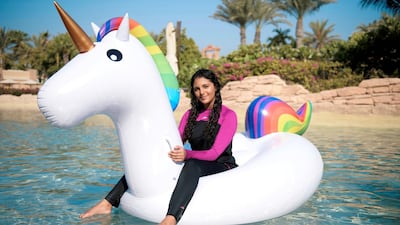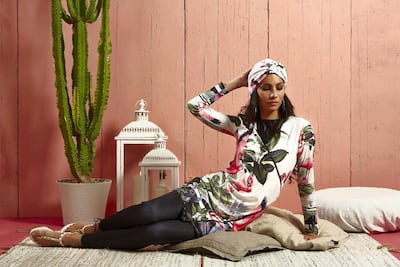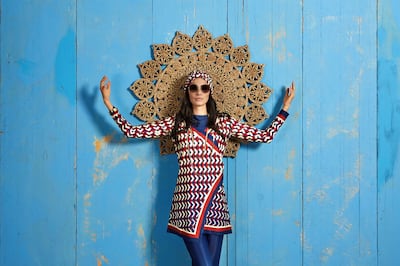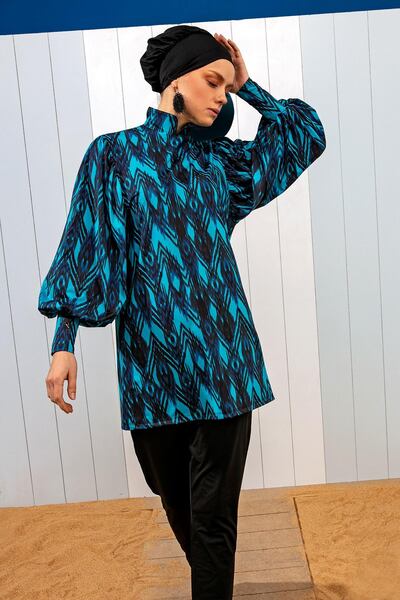Typically black and aesthetically plain, the original burkini was regarded more as a necessity for women seeking to cover their skin while swimming, as opposed to a covetable style splurge. Then hijab-wearing model Halima Aden made a splash in the 2019 edition of Sports Illustrated Swimsuit. Donning vibrantly hued swimwear that covered her whole body, Aden helped to dispel stereotypes surrounding the burkini on a mainstream level. The current international spotlight on modest fashion, too, has made room for burkinis to emerge as their own retail category.
The debate over burkinis
Pre-burkini, when conservatively clad Muslim women would resort to wearing baggy shirts with leggings at public pools and beaches, they'd often get turned away by lifeguards citing their clothing as inappropriate or hazardous for swimming. The burkini, crafted from swimsuit material and fitted to the wearer's body, provides an exciting alternative for these consumers.
However, there has been widespread controversy over the burkini, causing it to be banned in parts of France, Germany and even tourism hotspots in Morocco. These restrictions are touted as being put in place for “hygienic reasons” and to prevent beachwear that appeared “religious” in public spaces, thereby preventing “public disorder”. Those in favour of the ban argue that burkinis are a symbol of oppression, and stand against European enlightenment ideals that value freedom and individualism, and many women found violating the bans have been given written warnings, fined or arrested.
"What? Muslim women going swimming are now seen as oppressed? Packing swimwear for a holiday has never been so political!" writes modest fashion blogger Dina Torkia in her autobiography Modestly. "Somehow the 'burk' bit of the burkini managed to convince those who oppose it that it's a repressive piece of swimwear for Muslim women," she writes.
'Real women want to look elegant, chic and glamorous'
If anything, for women who wear the hijab or dress modestly from the neck down, the burkini provides the perfect compromise between their commitment to faith and their desire to take part in public water activities, leading many mainstream retailers to create their own versions. For autumn / winter 2019, British swim brand Speedo launched its Delight Full Body Suit, which is essentially a range of leggings and long rash guards that aren't as form-fitting as conventional surfer styles.
"It offers the most stylish, high-quality and flattering full-coverage swimwear that Speedo has created yet," says brand manager Neha Munjal. "The team researched different materials that would suit the requirements of modest swimwear apparel, which would allow the performance of a serious swimmer while meeting the requirements of modest dressing. For example, what would prevent the most drag in the water, yet not cling too much or become partially transparent when wet." The Delight Full Body Suit is available in four colourways, and the brand has also created a separate head cover for women who wear the hijab.
Established brands aside, independent designers across the globe are choosing to specialise in this niche market, too. "Real women want to look elegant, chic and glamorous," says Ayca Makbule Ture, the designer behind Turkish brand Mayovera, which launched modest swimwear in 2015 featuring sequined and leopard patterns. "Women prefer detailed clothes, not plain clothes, so why not on the beach, too?" The designs she put on the runway at this year's Modanisa Istanbul Modest Fashion Week couldn't even be distinguished as swimwear at first glance – they looked like sophisticated ready-to-wear separates, giving consumers convenient beach-to-boardwalk ensembles.
Italian fashion designer Chiara Taffarello launched her burkini brand Munamer ("Muna" is Arabic for desire and "mer" is French for sea) at the London Muslim Lifestyle Show in 2018. Her brand was inspired by travels to Pakistan, where she noticed that many Muslim women avoided hotel swimming pools due to a lack of readily available covered-up swimwear. Her burkinis feature heritage block prints and wrap silhouettes, and some are reminiscent of South Asian kurtis or tunics. "For the geometric styles, I got inspirations from Islamic art, gardens and labyrinth designs, and some traditional fabric patterns from Africa, India and Mexico," she says.
Munamer burkinis are all manufactured in Italy and marketed as luxury modest swimwear – they’re priced at about Dh1,000. “People aren’t used to considering the burkini as something that’s ‘fashion’, so they are still wary about investing more money on a swimsuit … they need to know that something more sophisticated, high quality and premium exists in the market,” says Taffarello.
But the burkini doesn't have to just be for religious purposes
The burkini has even been donned by women who simply seek protection from UV rays or aren't comfortable putting their bodies on display. British television star Nigella Lawson and Hollywood's Lindsay Lohan are two famous faces who have opted for burkinis while on holiday. Likewise, while most of Taffarello's clients live in Europe and the UAE, her luxury swimwear is attracting non-Muslims, too. "Recently I got some orders from Italian women who want to protect their skin while wearing something feminine and comfortable."
The first mainstream burkini, too, was never intended as a symbol for Islam – it was simply another swimwear option for women, says its creator Aheda Zanetti. The Australian-Lebanese designer came up with the first burkini, and coined the word, in 2003. Although it's now widely used to refer to modest swimwear, and has inspired countless other conservative designs, the term is trademarked to her brand Ahiida.
There's even an appetite for burkinis in France – the country that has notoriously banned the swimwear in more than 15 towns. Nonetheless, the Brazilian designer of Madamme BK, Vanessa Lourenco, has made a business out of selling burkinis in Paris. "Muslim women do not have the wide selection of swimwear that western women do, and I understood this issue nine years ago," she says. "To see that they were struggling to enjoy a simple thing such as swimming in the ocean or a public swimming pool on a sunny day, something that I love to do, struck me as something unacceptable."
The clincher came when Lourenco went with a group of women for a beach holiday in the South of France, and saw her Muslim friends struggling to find swimwear that was both covered and stylish, so she designed modest swimsuits for four of them. The reaction was so positive that she launched her own burkini brand – one that has a focus on sustainability, with free trade fabrics coloured with eco-friendly dyes, and an emphasis on paying seamstresses higher-than-minimum wages.
Ironically, Lourenco says that burkini bans helped catapult her business. "The consequence is that our product went all over the globe – everybody finally knew what a burkini is, so the ban actually helped us to spread [awareness about] our product."
Political events may have brought burkinis to the limelight, and while they may seem contrary to international feminist ideals or may be laughed off as unfashionable by some, they serve a market with powerful spending power. The State of the Global Islamic Economy Report from Reuters and DinarStandard estimates that by 2021, global Muslim consumer spending will reach $368 billion (Dh1.351 trillion).
"Creating awareness and understanding is already a large step forward in changing people's attitudes to this innocent, but liberating, style," says Lourenco, using words to describe the burkini that challenge the aggressive agenda that opposes it. "Fashion is democratic, and should be for everyone."




